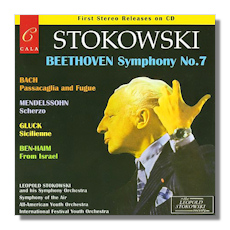
The Internet's Premier Classical Music Source
Related Links
-
J.S. Bach Reviews
Beethoven Reviews
Ben-Haïm Reviews
Gluck Reviews
Mendelssohn Reviews - Latest Reviews
- More Reviews
-
By Composer
-
Collections
DVD & Blu-ray
Books
Concert Reviews
Articles/Interviews
Software
Audio
Search Amazon
Recommended Links
Site News
 CD Review
CD Review
Stokowski

First Stereo Releases
- Ludwig van Beethoven: Symphony #7 1
- Johann Sebastian Bach: Passacaglia & Fugue 2
- Felix Mendelssohn: Midsummer Night Dream: Scherzo 3
- Christoph Willibald Gluck: Siciliene from Armide 4
- Paul Ben-Haïm: From Israel 1
1 Symphony of the Air/Leopold Stokowski
2 International Festival Youth Orchestra/Leopold Stokowski
3 All-American Youth Orchestra/Leopold Stokowski
4 Leopold Stokowski Symphony Orchestra/Leopold Stokowski
Cala CACD0551
This release is a microcosm of the recording history of Leopold Stokowski. It contains standard fare, like the Beethoven, represents his work as a composer, the Bach, his experimenting with sound reproduction, the Mendelssohn, and commitment to contemporary music, Ben Haim. I wrote this before reading the insert notes which pretty much say the same. It is a fitting last release for the Leopold Stokowski Society.
First let me talk about the "Symphony of the Air" recordings. I don't think I ever had the chance to listen to either. The stereo Beethoven has not been available for some time. The orchestra, the NBC Symphony Orchestra after Toscanini's retirement, reveals itself to be as virtuosic as ever. Stokowski's interpretation here is more dynamic than his later stereo recording. The Ben Haim is excellent music. He captures the almost Arabic sound of the Israeli music. Sonically both are far superior to the EMI releases. These recordings were often made around midnight and it sounds like recordings made late at night. There's an almost "empty space" feel to it. The EMI releases were thin and shallow, not much bass line. The remastering by Paschal Byrne gives us that "Stokowski Sound" in clear, beautiful detail.
The Bach is from 1973 and arguably the finest of Stokowski's recordings. At that session he also recorded a fantastic Tchaikovsky 5th from Cameo Classics (Cameo Classics CC9007CD). I sense more poignancy here than in his other recordings. Stokowski had been making recordings of his Bach arrangements early in his career in Philadelphia at a time when most people wouldn't be able to hear any Bach.
The Mendelssohn was taken from binaural experimental recordings with Columbia. While this is not the kind of stereo you hear today, it certainly demonstrates that Stokowski, as always, was trying to get the best possible sound out of a recording process that many conductors couldn't stand.
I must mention the "cover" art for the Beethoven 7th. It is almost surreal.
Kudos for all! A tribute to a conductor whose recording career was from 1917 to 1977, thanks in large part to Cala and the efforts of Ed Johnson. Looking over the CDs in the library we can be thankful that damn near every recording Stokowski made is now available, something not the case in the days of LPs.
Copyright © 2010, Robert Stumpf II




















